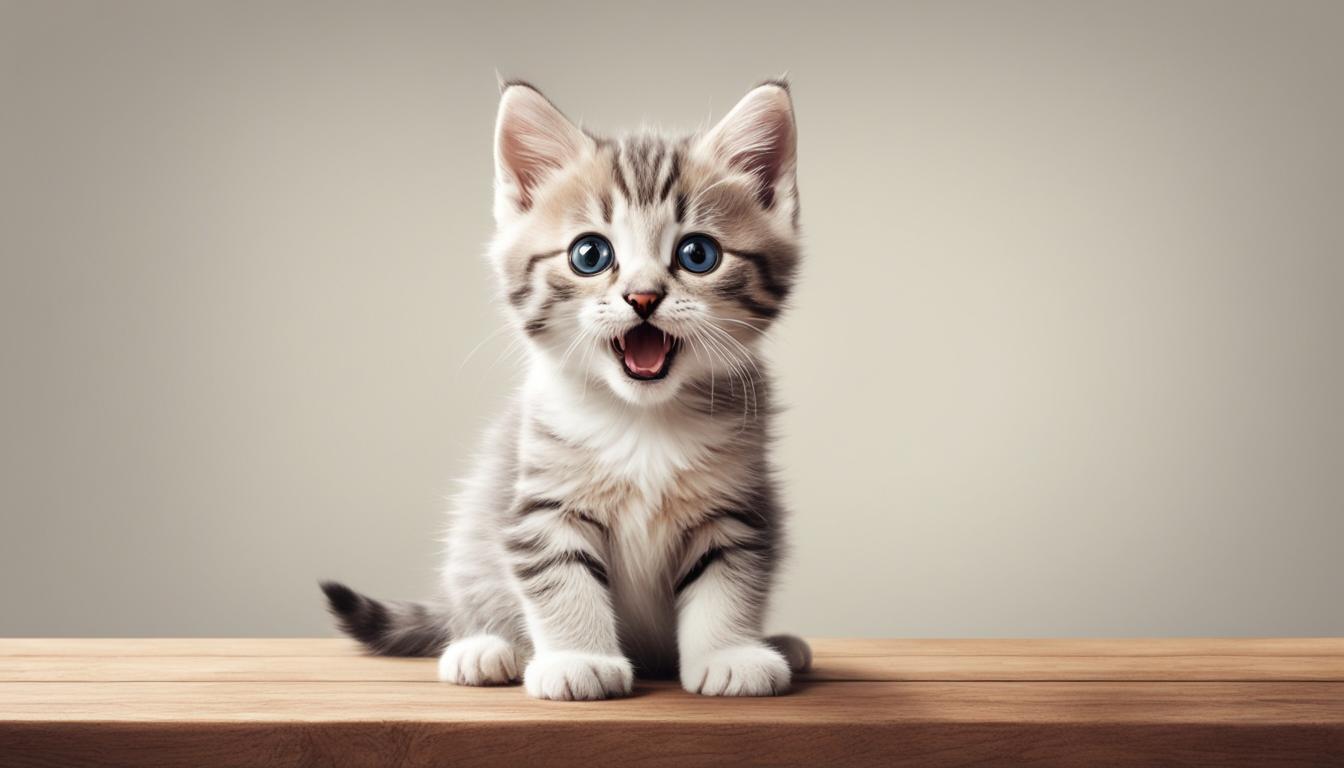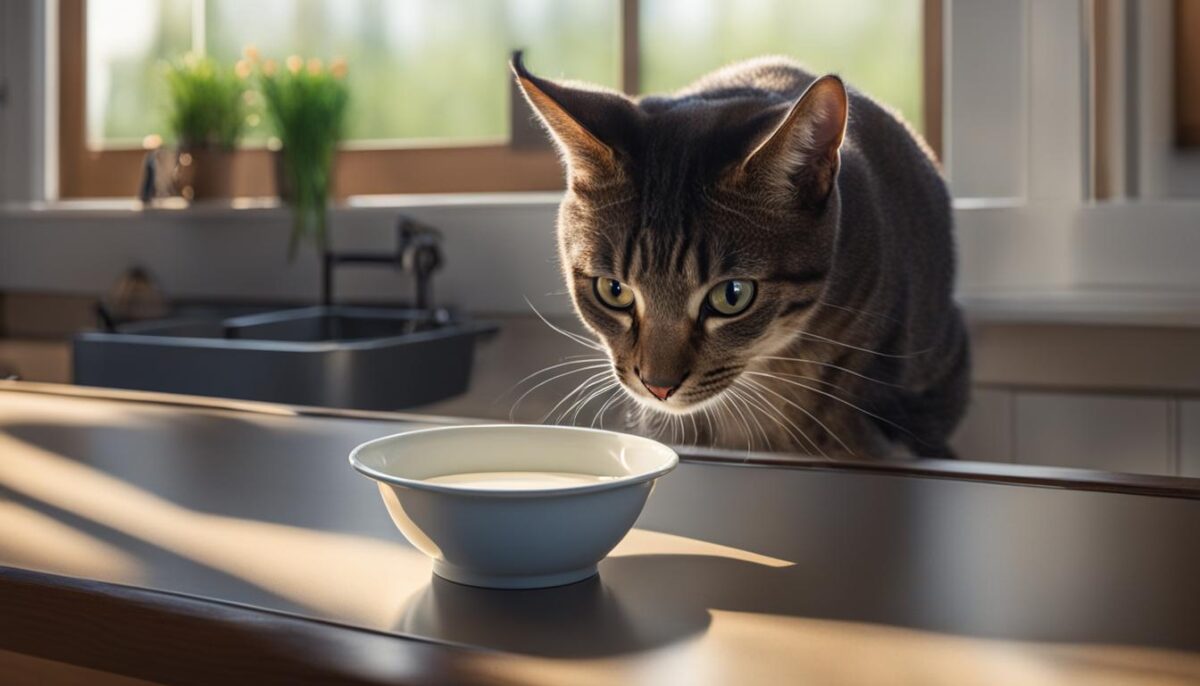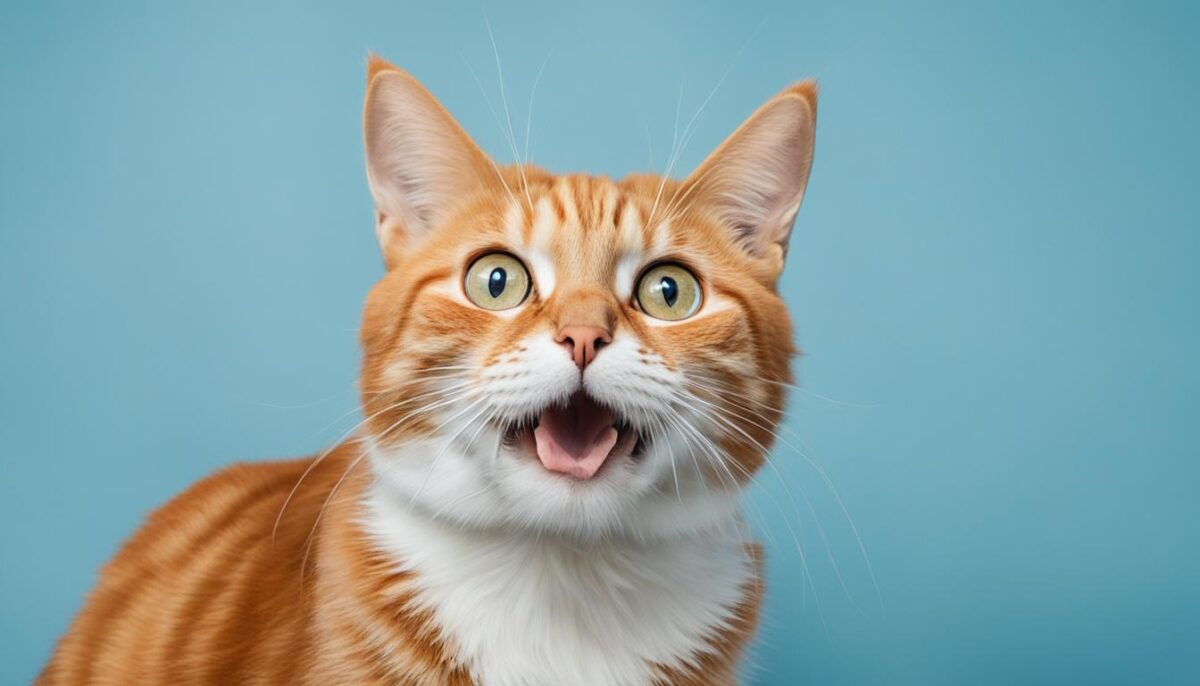Have you ever watched your kitty and wondered if cats get the same little jumps in their belly that we do when we get hiccups? Well, they sure can! These quick little breaths, or feline hiccups, are something both you and your furry friend might have in common. When your cat gets hiccups, it happens because something inside, called the diaphragm, is doing a funny dance it’s not supposed to. And guess what? This happens more often with the young ones, so don’t be surprised if you notice your kitten hiccups after a round of energetic play or a quick snack.
Most times, these hiccups are no big deal and are just a quirky part of cat health. Just like when you get the hiccups, there’s usually no reason to worry about your cat. But you might wonder, what causes those hiccups? Let’s keep it simple: think about how you feel when you guzzle a drink too fast or laugh while eating. Your body says “Hey, slow down!” with a hiccup. Cats can be the same, especially when they munch on their meals a little too quickly.
Key Takeaways
- Cats can hiccup just like you, especially the little ones known as kittens.
- Those belly jumps in cats, or hiccups, come from a jumpy diaphragm.
- Watching your cat eat too fast might be why you’re hearing those hiccup sounds.
- Kitten hiccups are common and usually nothing to stress about.
- If your cat’s hiccups go on for a long time, it might be a good idea to visit the vet.
Introduction to Feline Hiccups
Have you ever noticed your cat making sudden, odd noises? It might surprise you, but your furry friend can get hiccups! Yes, feline hiccups are a real thing, and understanding them can help you make sure your cat is happy and healthy.
What Are Cat Hiccups and How Do They Happen?
When your cat gets hiccups, it’s all about the cat diaphragm. This is a thin muscle that sits at the bottom of the chest and helps with breathing. Sometimes, this muscle starts to twitch or spasm, leading to the funny sounds we call hiccups. These feline diaphragm contractions can happen for a few reasons, like if your cat eats too quickly or has an encounter with a pesky hairball.
The Similarities Between Human and Feline Hiccups
Believe it or not, hiccups in your cats are not much different from yours or mine. When cats hiccup, it’s the same sudden diaphragm movement followed by a fast closure of the vocal cords. This is what creates that characteristic hiccup sound. Sometimes, you and your cat may even have hiccups for the same reasons! So, next time you hear your cat’s tiny hiccup, remember it’s just like when you get them.
Always keep an eye on your cat’s hiccups; while they’re usually nothing to worry about, if they keep happening, you might want to chat with the vet. Knowing about understanding cat hiccups is part of taking good care of your furry buddy.
Understanding Kitten Hiccups and Adult Cat Health
Have you ever wondered if your furry little friend can get kitten hiccups? Well, just like humans, kittens and even older cats can experience these cute yet odd little spasms. These hiccups happen when the diaphragm, a muscle in your cat’s belly, gets a quick and involuntary case of the jumps. It’s totally normal and usually not a big deal!
While seeing your kitten hiccup can be adorable, you might worry about their health. But don’t fret! These tiny hiccups are often seen in younger cats and are not as common in adult cats. When your cat or kitten gets hiccups, it might be because they gobbled up their dinner way too fast. Yup, the same thing can happen to you when you chow down your food in a hurry and swallow too much air.
Now, if you have an adult cat, their health is super important. If those hiccups keep happening a lot or just seem unusual, it might be a good idea to have a chat with your vet. They know all about adult cat health and can make sure your cat is doing just fine.
Things that might make your cat hiccup, besides eating too fast, include playing super hard or maybe some changes happening around them that make them feel a little stressed. Cats, just like us, like their peace and quiet, so keep their corner of the world nice and calm. A comfy cat is a happy cat!
| Age of Cat | Common Causes of Hiccups | What You Can Do |
|---|---|---|
| Kittens | Eating too fast, excitement | Use a slow-feeder bowl, ensure a calm environment |
| Adult Cats | Stress, dietary changes | Regular check-ups, maintain a routine |
Remember, kitties of all sizes and ages might hiccup now and then, and it’s usually nothing to worry about. But, of course, you know your cat best. If something seems off or if the hiccups don’t say “bye” after a little while, it’s okay to ask for help from a vet. They’re like the superhero doctors for every cat’s needs!
Common Causes of Cat Hiccups
Have you ever noticed your cat hiccuping? It’s pretty cute, but do you know what causes those little hiccups? Cats can get hiccups just like us, and it often happens when they eat too quickly or have a messy hairball. Let’s learn more about why your furry friend might be hiccuping.
Eating Too Quickly: A Trigger for Hiccups
When cats gobble down their meals super fast, they can swallow lots of air. This air can make their tummy push up against their diaphragm – that’s a muscle that helps them breathe. When the diaphragm gets pushed around, it can make your cat have hiccups. To help them eat slower, try giving them smaller meals more often, or use a special bowl designed to slow down their eating.
The Diaphragm’s Role in Cat Hiccups
Just like in people, a cat’s diaphragm will spasm, and that is what causes a hiccup. It’s like a little twitch that happens out of the blue. If your cat is relaxed or goes back to eating normally, the hiccups should go away on their own. If they keep having hiccups a lot, it might be a good idea to check with a vet, just to be safe.
Hairballs and Hiccups: The Furry Connection
You know how cats love to clean themselves by licking their fur? Well, sometimes that fur can get stuck in their throat or belly, forming a hairball. This can tickle their throat and lead to hiccups. Regular brushing can help get rid of loose fur and may keep those pesky hairballs and feline hiccups away.
Distinguishing Hiccups from Other Feline Behaviors
When your fuzzy friend starts making odd noises, it can be hard to tell what’s going on. Are those just regular cat hiccup sounds, or is something else up? Cats are talkative creatures, and their sounds can mean a lot of different things. It’s like they have their own language, and we get to be detectives trying to figure it out!
Understanding the Sounds: Chirps, Coughs, and Hiccups
Cats make all sorts of sounds. There are meows, purrs, hisses, and even chirps. But when we talk about distinguishing cat sounds, we’re playing a game of ‘guess that noise’ with our furry friends. A hiccup might sound like a tiny ‘chirp’ beneath their breath. On the other side, if they are coughing or wheezing, those noises are more like a car with a rough engine. They tell you, “Hey! I’m not feeling purr-fect.” Knowing these sounds helps us be better pet pals.
When to Differentiate Between Hiccups and Medical Symptoms
Sometimes, what seems like a cute little hiccup could be a sign of something that needs a vet’s attention. It’s all about feline behavior and what your cat does besides those quirky noises. Are they still jumping and playing? Eating their dinner without a fuss? Then they’re likely A-OK. But if you notice they’re not acting like themselves or those hiccups just keep coming, it might be time to check in with a pro. It’s all about keeping your kitty happy and healthy!
Remember, your cat counts on you to understand what their sounds mean. You’re their best buddy, after all! Keep an ear out for those hiccups, and you’ll know when to simply smile at their cuteness, or when it’s time to help them out.
Addressing and Alleviating Hiccup Discomfort in Cats
When your lovely cat gets hiccups, you might wonder how long they’ll last and what you can do to help. Mostly, cat hiccups go away pretty quickly, but there are ways to manage them and keep your feline friend happy and healthy.
How Long Should a Normal Hiccup Episode Last?
If your cat’s hiccups hang around for more than a day, it might be a good idea to check in with a vet. They should be able to tell you if something else is making your cat’s tummy act up.
Simple Interventions to Reduce Hiccups
There are some smart and easy cat hiccup remedies that might help. For example, you can try to change how fast your cat eats. This can make a big difference in managing cat hiccups to improve your cat’s digestive health.
- Try a special bowl that lets your cat eat slower to stop the hiccups from happening so much.
- You can also give your cat smaller meals more often during the day.
- If hairballs are the trouble, a good brush every day and some hairball paste from the vet might do the trick.
| Problem | What You Can Do | Benefits |
|---|---|---|
| Eating Too Fast | Use a slow feeder bowl | Less hiccups, better tummy time |
| Too Much Food | Smaller, more frequent meals | Keeps kitty full minus the hiccups |
| Hairballs | Daily grooming and hairball remedies | Less hiccups and a shinier coat |
So if your cat is all hic-hic-hiccuping, try these ideas out! They might just make your cat’s day a whole lot better.
When to Seek Veterinary Care for Your Cat’s Hiccups
If your cat often gets hiccups, it might just seem cute or funny. But sometimes, hiccups can be a sign that your furry friend needs help from a vet. Let’s find out about the times when hiccups in cats can be serious and when you should get some veterinary care for cats.
Recognizing Signs of Chronic or Serious Conditions
Sometimes your cat might have what we call chronic cat hiccups. This means the hiccups happen a lot and don’t go away easily. If your kitty’s hiccups keep coming back or don’t stop, you should take a trip to the vet. There might be something more going on, like a problem with their tummy or even heart trouble.
You should also look out for other odd things, like if your cat is not eating well or seems very sleepy. If they’re making weird noises when they breathe or seem to have a hard time catching their breath, these could be feline medical conditions that a vet needs to check out.
How Your Vet Can Help With Persistent Hiccups
When you visit the vet, they can do some tests to see why your cat’s hiccups keep happening. They might listen to their heart, take pictures like X-rays, or look at their insides with a special camera. It sounds like a lot, but they’re just making sure that they take the best care of your pet.
| Signs to Watch For | What It Might Mean | How Your Vet Can Help |
|---|---|---|
| Hiccups for more than a day | Possible stomach problems | Checkup and tests |
| Trouble eating or being very sleepy | Might be a sign of illness | Blood work and exams |
| Weird breathing noises | Possible asthma or heart issues | Listening to their heart and X-rays |
Remember, your vet is there to make sure your cat stays happy and healthy. If you’re worried about your pet’s hiccups, don’t be shy—go and ask for help. They know all about chronic cat hiccups and other feline medical conditions, and they can give you the best advice.
Conclusion
If you’ve ever watched your kitty hiccup, you might have wondered if it’s something to worry about. Well, here’s some good news: hiccups in cats are pretty normal, and they’re usually nothing to stress over. This is especially true for small kittens who might hiccup more often than grown-up cats.
Understanding the Normalcy of Cat Hiccups
Just like you, your cat can get hiccups sometimes. It can happen if they chow down their food too fast or if they take in a bit too much air. Most of the time, these little hiccups will go away all by themselves. It’s all part of being a cat!
Fostering Your Feline’s Health and Wellbeing
But, it’s also smart to keep an eye on your feline friend. If your cat’s hiccups happen a lot or they just don’t seem to stop, it’s a good idea to chat with a vet. Remember, caring for hiccupping cats is part of looking after their overall health. You want to make sure your cat is in tip-top shape, so keeping tabs on any quirky behaviors, like hiccups, is a big part of pet wellness. By paying close attention, you’re helping your cat live a happy and healthy life!
FAQ
What Are Cat Hiccups and How Do They Happen?
Cat hiccups are involuntary diaphragm contractions similar to what humans experience. They occur when a cat’s diaphragm contracts involuntarily, often caused by irritation of a nerve. This is common cat behavior, especially in kittens.
Can All Ages of Cats Experience Hiccups?
Yes, cats of all ages can get hiccups, but it’s more common in kittens. Adult cats can also experience hiccups due to various triggers, such as eating too fast or stress.
Why Does My Cat Hiccup When Eating Too Quickly?
When a cat eats too rapidly, it tends to swallow air, which can lead to the rapid contracting of the diaphragm and result in hiccups. Slowing down their eating pace can help reduce the frequency of hiccups.
Can Hiccups Be a Sign of Hairballs in Cats?
Yes, hiccups can sometimes be associated with hairballs. Hairballs occur when cats groom themselves and swallow fur, which can irritate the throat and diaphragm, potentially triggering hiccups.
Do Cat Hiccups Sound Like Human Hiccups?
Not always. Cat hiccups can sometimes sound more like a chirp or other subtle noises, which is why it’s crucial to differentiate them from other symptoms like coughing, wheezing, or reverse sneezing.
How Long Should a Normal Hiccup Episode Last in Cats?
A typical hiccup episode in cats is usually brief and should not last beyond a day. If your cat’s hiccups persist longer, consider consulting a veterinarian.
What Can I Do to Help Reduce My Cat’s Hiccups?
To help reduce hiccups, try feeding smaller meals more frequently, use a slow feeder to prevent them from eating too quickly, improve their grooming routine to help with hairballs, and reduce stress in their environment.
When Should I Be Concerned About My Cat’s Hiccups?
While occasional hiccups are not a big concern, frequent or persistent hiccups can be a sign of a more serious condition like respiratory issues, digestive problems, or even heart disease. In such cases, it’s best to seek veterinary care.
How Can a Veterinarian Assist With Persistent Cat Hiccups?
A veterinarian can conduct a thorough examination, possibly including tests, to determine the cause of persistent hiccups. They can then provide appropriate treatment, which may range from dietary changes to medication, depending on the underlying cause.
How Important Is It to Monitor My Cat’s Hiccupping Behavior?
It’s quite important to monitor your cat’s hiccups, as they can occasionally indicate an underlying health issue. Keeping track of the frequency and duration can help you and your vet understand whether it’s a simple hiccup or something that requires medical attention.


